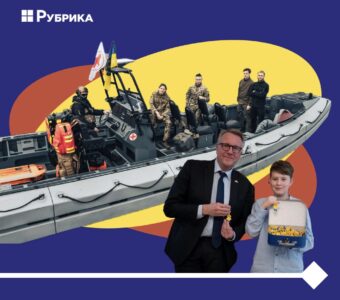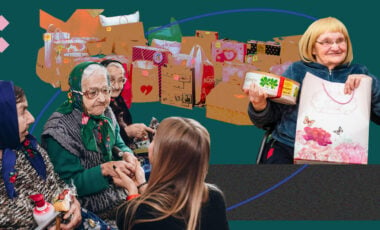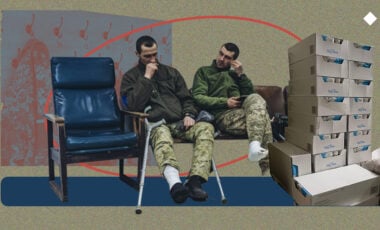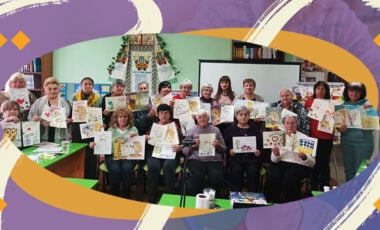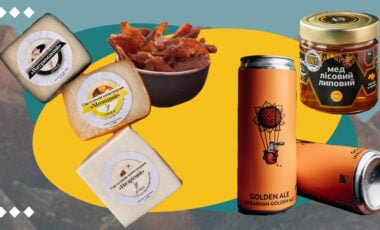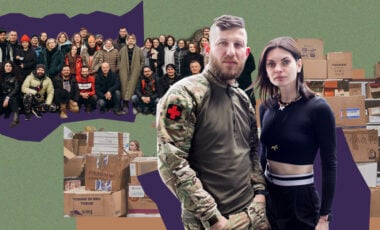What does Ukrainian identity look like? Looking for answers in the Living Library of the RIGHTS NOW! Human Rights Programme
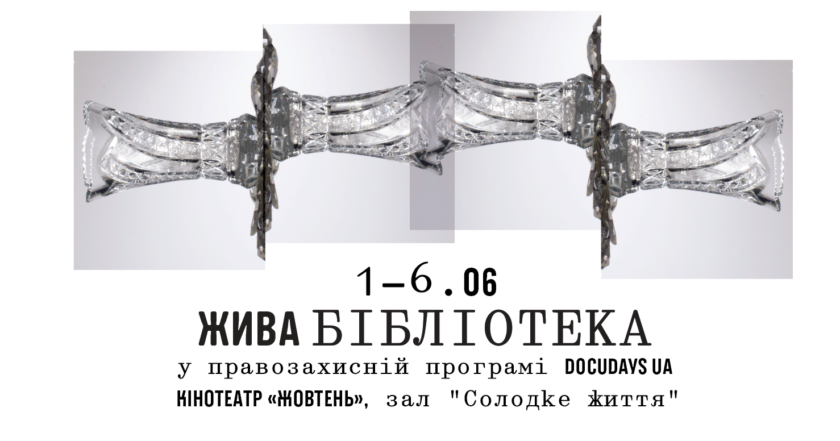
On 1–6 June, the Living Library will be active as part of the RIGHTS NOW! Human Rights programme of the Docudays UA International Human Rights Documentary Film Festival.
This year we are organising the Living Library in a new format. Instead of individual readings, we offer you to attend open readings, public moderated conversations. The 'books' in the Living Library will be prominent experts, artists, veterans, united by the experience of fighting for the preservation and restoration of the Ukrainian national identity. You will learn how Ukrainian identity in history, literature, music, and filmmaking can help disprove Russian myths about 'brotherly nations,' communicate the truth about the war in Ukraine and the crimes of the terrorist state.
During the ten-year war that has been going on for three centuries, the enemy seeks to destroy not only our statehood but also our identity. Because it is the understanding of ourselves as one nation with its own history and path of development that separates Ukrainians from the consumers of the narratives of the Russian colonial policy. The war has demonstrated once again the nation-making influence of language, music, art, and history.
An important part of discussions in the Living Library will be the Bridge from the Frontline. Ukrainian defenders, medics and volunteers from the battle zone will communicate with the readers.
The open conversations of the Living Library will be held at 5:30–7:00 p.m. at the Zhovten Cinema (Dolce Vita hall). Access to the events is free.
Living Library event schedule:
1 June
5:30–7:00 p.m.
Crimea and Ukraine: Identity through the lens of history
Crimea was among the first areas to suffer from Russian aggression. Over 10 years of occupation is a long period of time during which it is important for Ukraine not to lose the connection to the occupied peninsula and the communities on it. The enemy does not just capture our territories but also carries out historic and cultural occupation.
In this public reading, we will talk with the books about:
- How to strengthen connections with the occupied peninsula and remember about the historic and cultural commonalities that connect us?
- What (cultural) challenges during the future integration of this region after de-occupation will the state and civil society face, and how should we prepare for this process?
- How to counteract the influence of Russian cultural imperialism and build a shared national identity?
Books:
Elmira Ablialimova, cultural researcher, project manager at the Crimean Institute for Strategic Research, former director of the Bakhchysarai History and Culture Reserve;
Gulnara Abdulayeva, historian.
Moderator:
Yevhen Pavliukovsky, journalist.
________________________________________________________
2 June
5:30–7:00 p.m.
Language and war: Identity through the lens of literature
During Russia's centuries-long attempts to destroy the Ukrainian national identity, literature has been accumulating and storing the ideas of the restoration of Ukrainian statehood. Contemporary Ukrainian literature reflects the experience of living through war in the heart of Europe. New writers emerge who gain this experience directly in the battle zone.
In this public reading, we will talk with the books about:
- How does literature, particularly veteran literature, create a new layer of Ukrainian identity?
- Does this body of work sufficiently influence the shaping of a strong social and national consciousness?
- What challenges does literature face today?
Books:
Olena Herasymyuk, writer, paramedic in the Hospitaliers Medical Battalion;
Anastasia Rozlutska, founder of the E-Mova education platform, head of the NGO Ukrainian World.
Online:
Vitaliy Zapeka, writer, screenwriter, artillery gunner in the Armed Forces of Ukraine.
Moderator:
Yevhen Pavliukovsky, journalist.
________________________________________________________
3 June
5:30–7:00 p.m.
Showing resilience: Identity through the lens of music
Music is an important component of any national culture. During Ukrainian independence, our language has been oppressed by the expansion of the Russian musical product. The Russian colonial policy tried to impose the stereotype that everything created by Ukrainians was marginal and not worth the attention of the broader audience. With the full-scale war and the processes of de-Russification, Ukrainian music has gained a chance to be heard.
In this public reading, we will talk with the books about:
- How do we avoid wasting the credit of interest in Ukrainian music and transform it into an instrument of competitiveness?
- How is the war transforming the Ukrainian musical market?
- Are Ukrainian listeners ready to support their own?
Books:
Oleksiy Bondarenko, editor-in-chief of the LiRoom media about the new Ukrainian culture, co-author of the Zvuchyt YouTube channel;
Albert Tsukrenko, journalist, musician, member of Hammerman Destroys Viruses and Old School Ukrainian Funk.
Moderator:
Yevhen Pavliukovsky, journalist.
________________________________________________________
4 June
5:30–7:00 p.m.
Return what we have lost: Ukrainian identity of the East
In the occupied Ukrainian territories, Russia eradicates everything that is Ukrainian. In the years of the occupation of Donetsk and Luhansk Regions, Ukraine has lost major cultural layers and values. Difficult socioeconomic and security circumstances make the situation even worse. In these conditions, Ukraine faces the challenge of not only rapid economic and social integration, but also cultural and historic de-occupation.
In this public reading, we will talk with the books about:
- How do we return the identity and values denied by the myths of Soviet and Russian propaganda to the East and its residents?
- What should be the model of development of cultural environments in cities, towns and villages, which would allow people to feel like a part of the Ukrainian and European cultural space?
- What should the government's cultural policy in the East be like?
Books:
Oleksiy Mustafin, publicist, historian, media manager, author of the book Pearls in the Steppe. Conversations about the past of the Ukrainian South;
Maksym Vikhrov, journalist, writer, author of the book Wild East. An essay of the history and present of the Donbas.
Online:
Stanislav Aseyev, journalist, publicist and writer.
Moderator:
Yevhen Pavliukovsky, journalist.
________________________________________________________
5 June
5:30–7:00 p.m.
Cultural resistance: Identity through the lens of modern art
During the war, art plays an important role in representing the country and uniting people around shared values. The scale of the crimes committed by Russia in the Ukrainian territory cannot be ignored by the world of art. Reflections of the war in art helps us tell the truth to the world and shape the demand for justice.
In this public reading, we will talk with the books about:
- What does Ukrainian art speak about during the war and how is it perceived by the world?
- How is the topic of war being processed in artistic practices?
- What, apart from the war, does the Ukrainian artistic discourse produce?
Books:
Olha Balashova, art researcher and critic, co-founder of the NGO Museum of Modern Art;
Zhanna Kadyrova, Ukrainian artist.
Moderator:
Yevhen Pavliukovsky, journalist.
________________________________________________________
6 June
5:30–7:00 p.m.
Spirit of freedom: Identity through the lens of cinema
Ukrainian cinema is facing new challenges during the war. In the times of full-scale aggression, Ukraine has to oppose misinformation and propaganda which Russia tries to broadcast in the civilised world. So cinema becomes an important instrument to demonstrate the realities of the war and its impact on people's lives, and to remind the world what the value of freedom is all about.
In this public reading, we will talk with the books about:
- What should Ukrainian cinema be like during the war and how has the industry changed?
- How does the film industry affect the popularisation of Ukraine in the world?
- What should state support for cinema look like during the war?
Books:
Olena Honcharuk, winner of the competition for the position of the Director General of the National Oleksandr Dovzhenko Centre, Head of the Dovzhenko Centre Museum of Cinema, cultural manager, museologist;
Olha Birzul, film curator, cultural manager, author of the publication Your Book about Cinema.
Moderator:
Yevhen Pavliukovsky, journalist.




